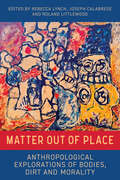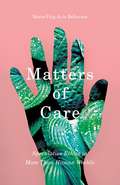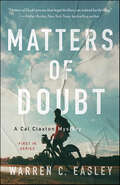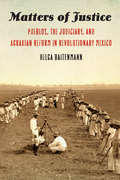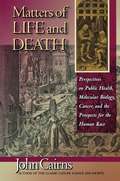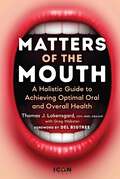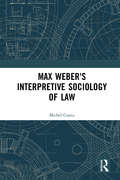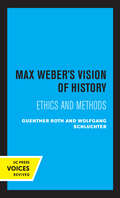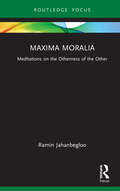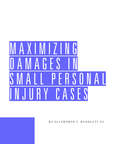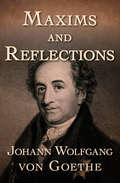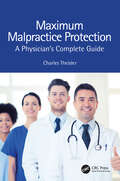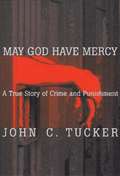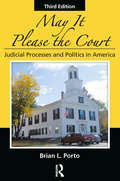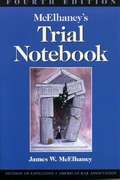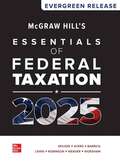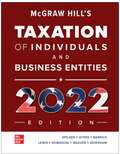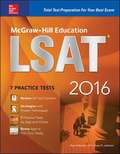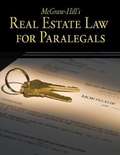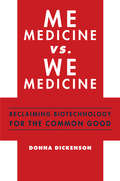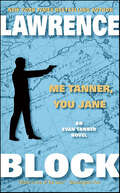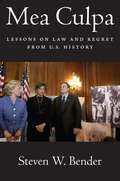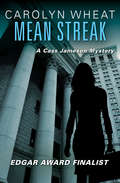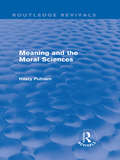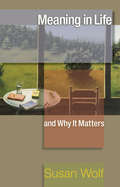- Table View
- List View
Matter Out of Place: Anthropological Explorations of Bodies, Dirt and Morality
by Roland Littlewood Rebecca Lynch, Joseph CalabreseAnthropologists often use ‘pollution’ to refer to social and individual challenges to a cultural idea of purity, which may be seen in terms of religious practice, foodstuffs and social differentiation. It has been used as a trope to explore ideas of dirt and place, moral inversion and reinforcement, disgust and taboo. The book is an invitation to consider the continued relevance of Mary Douglas’ conceptualization of pollution and dirt as ‘matter out of place’ in relation to contemporary circumstances. Its ethnographic and theoretical contributions cover diverse contexts, ranging from Europe to Africa, the Caribbean, India and Outer Space.
Matters of Care: Speculative Ethics in More than Human Worlds (Posthumanities #41)
by María Puig de la BellacasaTo care can feel good, or it can feel bad. It can do good, it can oppress. But what is care? A moral obligation? A burden? A joy? Is it only human? In Matters of Care, María Puig de la Bellacasa presents a powerful challenge to conventional notions of care, exploring its significance as an ethical and political obligation for thinking in the more than human worlds of technoscience and naturecultures. Matters of Care contests the view that care is something only humans do, and argues for extending to non-humans the consideration of agencies and communities that make the living web of care by considering how care circulates in the natural world. The first of the book&’s two parts, &“Knowledge Politics,&” defines the motivations for expanding the ethico-political meanings of care, focusing on discussions in science and technology that engage with sociotechnical assemblages and objects as lively, politically charged &“things.&” The second part, &“Speculative Ethics in Antiecological Times,&” considers everyday ecologies of sustaining and perpetuating life for their potential to transform our entrenched relations to natural worlds as &“resources.&” From the ethics and politics of care to experiential research on care to feminist science and technology studies, Matters of Care is a singular contribution to an emerging interdisciplinary debate that expands agency beyond the human to ask how our understandings of care must shift if we broaden the world.
Matters of Doubt: A Cal Claxton Mystery (Cal Claxton Mysteries #1)
by Warren C EasleyWho can you turn to when society spits you out?Former LA prosecutor Cal Claxton has escaped to the Oregon wine country after his wife's suicide, determined to live a less-harried life. He's gotten a dog for company and takes pleasure in simple things like hiking, fishing, and crafting gourmet meals from the area's bounty, which he enjoys with local wines. He has no career ambitions, other than to sustain a small practice that will allow him to pay his bills. Then he's approached by a homeless street artist from Portland who wants him to take on the cold case investigation of his mother's murder. The young man believes his mother's boyfriend killed her eight years earlier, but the police were never able to solve the case. Cal turns him away. But his conscience won't let him rest…Cal takes on the case against his better judgment. Soon, however, the street artist is charged with the boyfriend's murder, and Cal has to battle bias from the press, police, and public, along with his own doubts about his client in order to determine who has committed both crimes—and why.
Matters of Justice: Pueblos, the Judiciary, and Agrarian Reform in Revolutionary Mexico (The Mexican Experience)
by Helga BaitenmannAfter the fall of the Porfirio Díaz regime, pueblo representatives sent hundreds of petitions to Pres. Francisco I. Madero, demanding that the executive branch of government assume the judiciary&’s control over their unresolved lawsuits against landowners, local bosses, and other villages. The Madero administration tried to use existing laws to settle land conflicts but always stopped short of invading judicial authority. In contrast, the two main agrarian reform programs undertaken in revolutionary Mexico—those implemented by Emiliano Zapata and Venustiano Carranza—subordinated the judiciary to the executive branch and thereby reshaped the postrevolutionary state with the support of villagers, who actively sided with one branch of government over another. In Matters of Justice Helga Baitenmann offers the first detailed account of the Zapatista and Carrancista agrarian reform programs as they were implemented in practice at the local level and then reconfigured in response to unanticipated inter- and intravillage conflicts. Ultimately, the Zapatista land reform, which sought to redistribute land throughout the country, remained an unfulfilled utopia. In contrast, Carrancista laws, intended to resolve quickly an urgent problem in a time of war, had lasting effects on the legal rights of millions of land beneficiaries and accidentally became the pillar of a program that redistributed about half the national territory.
Matters of Life and Death: Perspectives on Public Health, Molecular Biology, Cancer, and the Prospects for the Human Race
by John CairnsCancer has become the scourge of the twentieth century. It was always part of the human condition, but until recently it was not a common cause of death because most people died from the infectious diseases. Now that so many of us will live long enough to develop cancer, we need to learn as much about it as we can. This requires some understanding of molecular biology. John Cairns has made significant contributions to cancer research, molecular biology, and virology. He believes that it is possible to explain what is known about cancer and about molecular biology in terms that are easily understood by people with little or no scientific training. In this fascinating book, he explores the revolution in public health, the origins and principles of molecular biology, and our emerging understanding of the causes of cancer. Finally, he discusses how these developments are likely to affect future generations. As Cairns points out, the last two hundred years have altered our life expectations beyond all recognition. Even in the less developed nations of the world, people are starting to believe that everyone ought to be able to live into old age and be protected from the major causes of premature death. This change in our expectations is one of the major benefits of technology and the biological sciences. But the resulting explosion in the human population ultimately threatens everything we have gained by scientific progress.
Matters of the Mouth: A Holistic Guide to Achieving Optimal Oral and Overall Health
by Dr. Thomas J. LokensgardUncover the Truth About Oral Health and Wellness In Matters of the Mouth, Dr. Thomas Lokensgard challenges the conventional wisdom surrounding oral health and exposes the pervasive myths perpetuated by corporate interests. From fluoride to root canals, mercury fillings to chronic inflammation, Dr. Thom delves into the truths hidden behind the veil of misinformation. Drawing on years of experience as a leading practitioner of functional dentistry and integrative medicine, Dr. Lokensgard unveils the secrets to vibrant health through optimal oral care. With a keen focus on prevention and natural healing, he guides readers through essential topics, including: The intersection of dentistry and overall well-being Strategies to combat aging and oxidative stress Understanding chronic inflammation and its role in disease Harnessing the power of beneficial bacteria for oral health Navigating toxins in our food, water, and environment Debunking myths about root canals, TMJ, and cancer Practical tips for optimizing oral health and vitality Through empowering insights and actionable advice, Matters of the Mouth lets readers take control of their oral health and break free from the grip of the "sickness perpetuation" industry. It's time to embrace a new paradigm of wellness—one that prioritizes natural healing, toxin avoidance, and the body's innate ability to thrive. Discover the path to radiant health and vitality. Say goodbye to corporate deception and hello to a brighter, healthier future with Matters of the Mouth.
Max Weber's Interpretive Sociology of Law
by Michel CoutuThis book presents a clear and precise account of the structure and content of Max Weber's sociology of law: situating its methodological and epistemological specificity in relation to other approaches to the sociology of law; as well as offering a critical evaluation of Weber's usefulness for contemporary socio-legal research. The book is divided into three parts. The first part deals with the methodological foundations of Weber's sociology of law. The second analyses the central theme of this sociology, the rationalisation of law, from the perspective of its internal logical coherence, its empirical validity, and finally its legitimacy. The third part questions the present-day relevance of the Weberian sociology of law for socio-legal research, notably with regard to legal pluralism. Max Weber, it is demonstrated, is not merely a 'founding father' of the sociology of law; rather, his methodology, concepts, and empirical analyses remain highly useful to the further development of work in this area.
Max Weber's Vision of History: Ethics and Methods
by Guenther Roth Wolfgang SchluchterThis title is part of UC Press's Voices Revived program, which commemorates University of California Press’s mission to seek out and cultivate the brightest minds and give them voice, reach, and impact. Drawing on a backlist dating to 1893, Voices Revived makes high-quality, peer-reviewed scholarship accessible once again using print-on-demand technology. This title was originally published in 1979.
Maxima Moralia: Meditations on the Otherness of the Other
by Ramin JahanbeglooThis book highlights the problem of one-dimensional, reductionistic life of the modern individual. An expression of crisis in our world, it discusses the imperative need to have a more comprehensive, non-reductionist life where the Other is incorporated, especially the relationship between the Other and the Self, based on virtues like love, empathy, equality, and compassion. The volume sheds light on how the world has forgone the art of living for a mutilated sense of well-being, the rise of conformity and complacency in human thought, and the lack of democratic dissent and citizenry responsibility in our contemporary societies, which is now characterized by mass immaturity, propelled by a process of thoughtlessness. It discusses how humans need to be aware of the life they lead, to think about Otherness of the Other not just as another virtue but also as a crucial element in the survival of humanity, for people to coexist with the world around them as equals. Furthermore, it advocates meaningful and thoughtful existence, in touch with the Nature we coexist with, to ensure that humanity is not robbed of its noble spirit as we live to survive in our techno-capitalist societies. An introspective read, this book will be of great interest to scholars and researchers of moral and ethical philosophy, political philosophy, and political science.
Maximizing Damages in Small Personal Injury Cases
by Ellsworth RundlettMaximizing Damages in Small Personal Injury Cases Making a decent return on small cases is getting harder. The cost to process them keeps rising, while insurers and jurors are reducing settlements and awards. Here is help. Maximizing Damages in Small Personal Injury Cases equips you with the tools you need to screen, document, negotiate, and settle or litigate your smaller cases. In addition to practical guidelines and techniques, the book offers more than 100 custom-drafted checklists and pattern-specific forms to help reduce your time and costs. These short, simple forms are specifically tailored for small cases: * Liability checklists * Interrogatories * Deposition checklists * Adjuster letters * Motions * Trial preparation checklists * Even public relations letters
Maxims and Reflections (Ideas For Life Ser.)
by Johann Wolfgang von GoetheThoughts and ideas from the versatile and brilliant German writer and statesman. The German author of Faust takes a detour from his usual literary endeavors and offers snippets of his musings on life, literature, science, nature, politics, and the human condition. Essential for fans of Goethe&’s works, it provides a unique insight into the mind of the last true Renaissance man. This ebook has been professionally proofread to ensure accuracy and readability on all devices.
Maximum Malpractice Protection: A Physician’s Complete Guide
by Charles TheislerThe spectre of destructive malpractice lawsuits haunts every practicing doctor who simply wants protection and peace of mind, but most physicians find the world of malpractice confusing and wrapped in legal riddles. This book’s purpose is to explain medical malpractice concepts in everyday terms, combined with solid practical advice to help you: Protect and safeguard your medical career and practice Identify what is and isn't considered malpractice Readily comply with all legal duties required of doctors Prevent malpractice allegations and minimize liability Take control to protect assets, and minimize personal and professional losses Work with your attorneys to establish the best possible defense Walk through each clinical aspect of the patient encounter from the perspective of a malpractice attorney
May God Have Mercy
by John C. TuckerIn 1982, in Grundy, Virginia, a young miner named Roger Coleman was sentenced to death for the murder of his sister-in-law. Ten years later, the sentence was carried out, despite the extraordinary efforts of Kitty Behan, a brilliant and dedicated young lawyer who devoted two years of her life to gathering evidence of Coleman's innocence, evidence so compelling that media around the world came to question the verdict. The courts, ruling on technicalities, refused to hear the new evidence and witnesses. Finally, the governor of Virginia ordered a lie-detector test to be administered on the morning of Coleman's scheduled execution, and in a chair that to Coleman surely looked like nothing so much as an electric chair.
May It Please the Court, Third Edition: Judicial Processes and Politics In America
by Brian L. PortoThis practical, comprehensive, and engaging introduction to the American judicial system is designed primarily for undergraduate students in criminal justice, liberal arts, political science, and beginning law. It differs from other texts not only by delivering an insider’s view of the courts, but also by demonstrating how the judicial process operates at the intersection of law and politics. Unlike the many dull and inaccessible texts in this field, May It Please The Court conveys the human drama of civil and criminal litigation. With an updated epilogue, case studies, and discussion questions, this third edition is a robust resource for criminal justice students.
McElhaney's Trial Notebook
by James W. McelhaneyTrial Notebook offers hundreds of techniques and tactics for every stage of a trial's progress in spare, lively, memorable prose. You get strategies grounded in actual courtroom experience that will improve the effectiveness of your advocacy.
McGraw Hill's Essentials of Federal Taxation 2025
by John Robinson Connie Weaver Brian C. Spilker Benjamin C. Ayers Edmund Outslay Ronald G. Worsham John A. BarrickFULLY UPDATED FOR CURRENT TAX LAWS The bold and innovative McGraw Hill Taxation series is now the most widely adopted code-based Tax title across the country. It's apparent why the clear, organized, and engaging delivery of content, paired with the most current and robust tax code updates, is used by more than 650 schools. The breadth of the topical coverage, the storyline approach to presenting the material, the emphasis on the tax and non-tax consequences of multiple parties involved in transactions, and the integration of financial and tax accounting topics make this book ideal for the modern tax curriculum.
McGraw Hill's Taxation of Individuals and Business Entities 2022 Edition
by John Robinson Connie Weaver Brian Spilker Benjamin Ayers John Barrick Troy Lewis Ronald WorshamThe bold and innovative McGraw-Hill Taxation series is now the most widely adopted code-based Tax title across the country. It’s apparent why the clear, organized, and engaging delivery of content, paired with the most current and robust tax code updates, is used by more than 600schools. <p><p> The breadth of the topical coverage, the storyline approach to presenting the material, the emphasis on the tax and non-tax consequences of multiple parties involved in transactions, and the integration of financial and tax accounting topics make this book ideal for the modern tax curriculum. <p><p> Story line Approach: Chapters introduce a set of characters facing specific tax-related situations with a conversational writing style, organization, and real-world focus <p><p> Integrated Examples: "What if" scenarios to illustrate how variations in the facts might/might not change the answers. <p><p> 100+ Videos: Provide students with on-demand walk-throughs of key Tax topics.
McGraw-Hill Education LSAT 2016
by Russ Falconer Drew D. JohnsonMcGraw-Hill Education: LSAT focuses on the fundamental concepts tested on the exam as well as the reasoning and analytical skills necessary to overcome common traps.
Mcgraw-Hill's Real Estate Law for Paralegals
by Lisa Schaffer Andrew WieteckiReal Estate Law for Paralegalspresents students with a clear, easy-to-understand, and exciting text in which they will learn about real property, personal property, and all of the facets inherent in real estate. The text includes a chapter dedicated solely to real estate closings. The students have access to numerous exercises, cases, and hands-on learning assignments (including sample forms) covering topics ranging from "Regulations and Encumbrances" to "Recording Statutes and Examinations. " The Paralegal Supersite Site
Me Medicine vs. We Medicine: Reclaiming Biotechnology for the Common Good
by Donna DickensonPersonalized healthcare—or what the award-winning author Donna Dickenson calls "Me Medicine"—is radically transforming our longstanding "one-size-fits-all" model. Technologies such as direct-to-consumer genetic testing, pharmacogenetically developed therapies in cancer care, private umbilical cord blood banking, and neurocognitive enhancement claim to cater to an individual's specific biological character, and, in some cases, these technologies have shown powerful potential. Yet in others they have produced negligible or even negative results. Whatever is behind the rise of Me Medicine, it isn't just science. So why is Me Medicine rapidly edging out We Medicine, and how has our commitment to our collective health suffered as a result? In her cogent, provocative analysis, Dickenson examines the economic and political factors fueling the Me Medicine phenomenon and explores how, over time, this paradigm shift in how we approach our health might damage our individual and collective well-being. Historically, the measures of "We Medicine," such as vaccination and investment in public-health infrastructure, have radically extended our life spans, and Dickenson argues we've lost sight of that truth in our enthusiasm for "Me Medicine." Dickenson explores how personalized medicine illustrates capitalism's protean capacity for creating new products and markets where none existed before—and how this, rather than scientific plausibility, goes a long way toward explaining private umbilical cord blood banks and retail genetics. Drawing on the latest findings from leading scientists, social scientists, and political analysts, she critically examines four possible hypotheses driving our Me Medicine moment: a growing sense of threat; a wave of patient narcissism; corporate interests driving new niche markets; and the dominance of personal choice as a cultural value. She concludes with insights from political theory that emphasize a conception of the commons and the steps we can take to restore its value to modern biotechnology.
Me Tanner, You Jane (Evan Tanner)
by Lawrence BlockIt's a jungle out there.Literally. At least for Evan Tanner, eternally sleepless sometime superspy, who finds himself in Africa on the trail of the AWOL ruler of tiny Modonoland. It seems the petty despot's gone missing, and he's taken the state treasury along with him.No stranger to impossible missions and international peril, Tanner's been in over his head before. This time, however, he's in imminent danger of being buried alive. And it all has to do with the CIA, white supremacists, moderate revolutionaries . . . and a blond jungle bombshell named (no joke!) Sheena. Tanner's always been a sucker for a pretty face and a curvaceous body, especially one that's wrapped in leopard skin. But this red hot renegade daughter of a local missionary is a maneater.Which means this time Tanner's goose is well and truly cooked.
Mea Culpa: Lessons on Law and Regret from U.S. History
by Steven W. BenderIn Mea Culpa, Steven W. Bender examines how the United States’ collective shame about its past has shaped the evolution of law and behavior. We regret slavery and segregationist Jim Crow laws. We eventually apologize, while ignoring other oppressions, and our legal response to regret often fails to be transformative for the affected groups. By examining policies and practices that have affected the lives ofgroups that have been historically marginalized and oppressed, Bender is able to draw persuasive connections between shame and its eventual legalmanifestations. Analyzing the United States’ historical response to its own atrocities, Bender identifies and develops a definitive moral compass thatguides us away from the policies and practices that lead to societal regret.Mea Culpa challenges its readers. In a different era, might we have been slave owners or proprietors of a racially segregated establishment? It’s easy to judge immorality in the hindsight of history, but what current practices and policies will later generations regret?More than a historical survey, this volume offers a framework for resolving some of the most contentious socialproblems of our time. Drawing on his background as a legal scholar, Bender tackles immigration, the death penalty, the war on terror, reproductive rights,welfare, wage inequity, homelessness, mass incarceration, and same-sex marriage. Ultimately, he argues, it is the dehumanization of human beings thatallows for practices to occur that will later be marked as regrettable. And all of us have a stake in standing on the side of history that resists dehumanization.
Mean Streak (The Cass Jameson Mysteries #4)
by Carolyn WheatIn the highest-profile case of her career, Cass defends her ex-lover in federal court in this Edgar Award–nominated legal thriller It&’s hard not to be charmed by Matt Riordan. Ruggedly handsome, with a sharp wit and a voice like Belgian chocolate, he could woo any jury. His clients may be mobsters, but Riordan never seems to have any trouble winning sympathy for them. That charisma worked on Cass Jameson, too, even though she should have been smart enough to know better. A hard-boiled defense attorney who&’s made a living going toe to toe with the meanest bastards in Brooklyn, Cass nevertheless fell for the Riordan charm—right until he broke her heart. Not long after Riordan runs out on her, Cass sees his smiling face on the cover of New York magazine. The most powerful defense attorney in New York has been accused of taking bribes, and he needs Cass to keep him out of jail. When one of Riordan&’s most vicious clients gets involved in the case, a smile won&’t be enough to keep him alive.
Meaning and the Moral Sciences (Routledge Revivals)
by Hilary PutnamFirst published in 1978, this reissue presents a seminal philosophical work by professor Putnam, in which he puts forward a conception of knowledge which makes ethics, practical knowledge and non-mathematic parts of the social sciences just as much parts of 'knowledge' as the sciences themselves. He also rejects the idea that knowledge can be demarcated from non-knowledge by the fact that the former alone adheres to 'the scientific method'. The first part of the book consists of Professor Putnam's John Locke lectures, delivered at the University of Oxford in 1976, offering a detailed examination of a 'physicalist' theory of reference against a background of the works of Tarski, Carnap, Popper, Hempel and Kant. The analysis then extends to notions of truth, the character of linguistic enquiry and social scientific enquiry in general, interconnecting with the great metaphysical problem of realism, the nature of language and reference, and the character of ourselves.
Meaning in Life and Why It Matters (The University Center for Human Values Series #40)
by Susan WolfA fresh reflection on what makes life meaningfulMost people, including philosophers, tend to classify human motives as falling into one of two categories: the egoistic or the altruistic, the self-interested or the moral. According to Susan Wolf, however, much of what motivates us does not comfortably fit into this scheme. Often we act neither for our own sake nor out of duty or an impersonal concern for the world. Rather, we act out of love for objects that we rightly perceive as worthy of love—and it is these actions that give meaning to our lives. Wolf makes a compelling case that, along with happiness and morality, this kind of meaningfulness constitutes a distinctive dimension of a good life. Written in a lively and engaging style, and full of provocative examples, Meaning in Life and Why It Matters is a profound and original reflection on a subject of permanent human concern.
